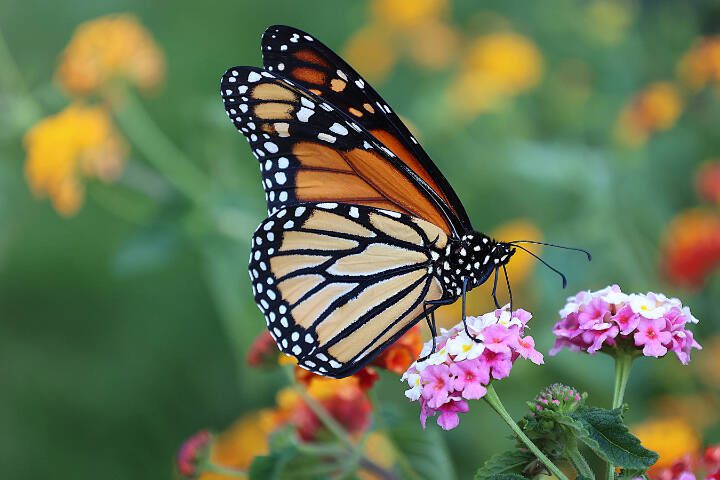By Trevor Cameron / The Golfing Gardener
June is National Pollinator Month, with June 17-23 being National Pollinator Week. It’s a campaign created by the nonprofit Pollinator Partnership, and recognized by the U.S. Department of Agriculture, to promote harmony between us humans and nature.
We all need to pause and give thanks to the little creatures that pollinate the flowers in our gardens. Yes, this is about our gardens, but, more importantly, this is about our local native habitats. Simply put, if there is no pollination, there are no seeds or plants, and the vast majority of our food sources are gone.
We all focus on bees, butterflies and hummingbirds, but many bats, birds, flies and other insects — even the wind itself — play pollinating roles in a healthy garden ecosystem. For me, having a naturally healthy, thriving garden means I get to see the busy bees buzzing about flowers every day, the hummingbird darting in to grab some nectar and the butterfly floating gracefully down to investigate a flower that caught it’s eye.
To kick off Pollinator Month, let’s review some of the ways we can actively support pollinators in our own gardens.
Plant a pollinator friendly garden: Do some shopping, ask some questions and explore your options so that you include a diverse array of flowering plants for multiple seasons of bloom. Ideally, flowers should vary in color, size and shape, and can include valuable natives, though many non-natives are also beneficial.
Providing a shallow water source and nesting sites: Having water in your garden will help quench pollinator thirst and boost overall health. This can be a simple bird bath or even a shallow pond. Keep in mind that the deeper it is, the more rocks or floating objects you need so that our little friends can land, relax and access the moisture safely. For bee nesting sites, leave some ground clear here and there for native ground bees to find, or consider adding bee houses or fun insect hotels for solitary bees to nest in. My younger son and I have a blast with our insect hotels and are continuously surprised with the number of beneficial insects that find shelter in them.
Avoid harmful pesticides of any kind: There is a safe, non-toxic, natural or organic solution available for almost any problem that arises in the home garden. Gardeners need to be more proactive and stay ahead of the game with safe preventatives. When a plant becomes infected with a harmful pest or disease, look at safe options for treatment instead of going straight to the old-fashioned bottles of “murder, death, kill,” as I call them. Natural products sometimes take a little longer to apply, or have to be done more frequently for best results, but I can attest to the fact that they absolutely are effective when used properly.
Timing is everything in the garden: After you have purchased a natural or organic product to use, the application timing is just as important. In my own yard, and here at Sunnyside, we only use safe products, including lots of neem oil, spinosad and insecticidal soap. But, for example, if I go out and spray these on my plants in full bloom on a sunny day at noon, I am still damaging pollinators. Get up early to apply, when pollinators are not active, or later in the evening for the same reason. A bee sprayed with neem oil is the same as one that has fed on a plant treated with systemics or neonics: a bee that will no longer be pollinating anything.
You can always seek advice from a certified professional horticulturist or take advantage of the vast amount of information on reputable websites, including those for the Washington State Department of Agriculture, Washington State University and Oregon State University.
Personally, I am honored to be serving as president of the Washington State Nursery and Landscape Association, a nonprofit dedicated to research on topics such as this and an organization whose main purpose is to pass on valuable knowledge. The association created pollinators.gardenwashington.com, a website that not only offers specific plant ideas but also educates us on safe garden products and practices.
The simple truth is that without our pollinating friends, our lives would be drastically different. Creatures such as bees, hummingbirds and butterflies perform an invaluable service that deserves to be celebrated. It is up to all of us to act as stewards of our beautiful ecosystem and to help ensure continued pollinator health for the next generation of gardeners.
Free class
Sunnyside Nursery in Marysville will host “Pruning in Summer” at 10 a.m. on Saturday, June 15. For more information or to sign up, go to www.sunnysidenursery.net/classes.
Trevor Cameron is a certified professional horticulturist (CPH) and serves as general manager for Sunnyside Nursery in Marysville. He can be reached at sunnysidenursery@msn.com.
Talk to us
> Give us your news tips.
> Send us a letter to the editor.
> More Herald contact information.



























